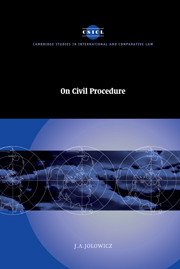Book contents
- Frontmatter
- Contents
- Preface
- List of abbreviations
- Introduction
- I The litigation process
- II Protection of diffuse, fragmented and collective interests
- III Procedural modes
- 8 Civil and administrative procedure
- 9 Adversarial and inquisitorial approaches to civil litigation
- IV The parties and the judge
- V Recourse against judgments
- VI Procedural reform
- Index
- CAMBRIDGE STUIDES IN INTERNATIONAL AND COMPARATIVE LAW
9 - Adversarial and inquisitorial approaches to civil litigation
from III - Procedural modes
Published online by Cambridge University Press: 18 December 2009
- Frontmatter
- Contents
- Preface
- List of abbreviations
- Introduction
- I The litigation process
- II Protection of diffuse, fragmented and collective interests
- III Procedural modes
- 8 Civil and administrative procedure
- 9 Adversarial and inquisitorial approaches to civil litigation
- IV The parties and the judge
- V Recourse against judgments
- VI Procedural reform
- Index
- CAMBRIDGE STUIDES IN INTERNATIONAL AND COMPARATIVE LAW
Summary
It is almost an article of faith on the part of common lawyers that because their civil procedure is ‘adversarial’ it is therefore superior to the ‘inquisitorial’ procedure which they believe to be used elsewhere. The word ‘inquisitorial’ conjures up visions of the Inquisition, and they do not care for the methods that common lawyers have been led to believe are used by inquisitors.
It seems desirable to stress at the outset, therefore, that no system of civil procedure can in the nature of things be wholly adversarial or wholly inquisitorial. It cannot be wholly inquisitorial because there is nothing to which a civil inquisitor can direct his enquiry unless and until one person has propounded a claim against another in more or less specific terms. It cannot be wholly adversarial because, even if we speak of the winner of a contest between the litigating parties, the winner of contested litigation cannot be determined objectively as can the winner of a race. Indeed, we neither expect nor require that the judge shall act as a human photo-electric device whose only function is to declare which of the litigants was in front when the contest ended. On the contrary, even in common law countries, we expect and require that the judge make use of his own knowledge and experience on matters of fact as well as of law - which means that he must enquire of himself - and we also expect, if we do not require, that he will enquire of others, as when he directs a question to a witness or engages in dialogue with counsel.
- Type
- Chapter
- Information
- On Civil Procedure , pp. 175 - 182Publisher: Cambridge University PressPrint publication year: 2000

